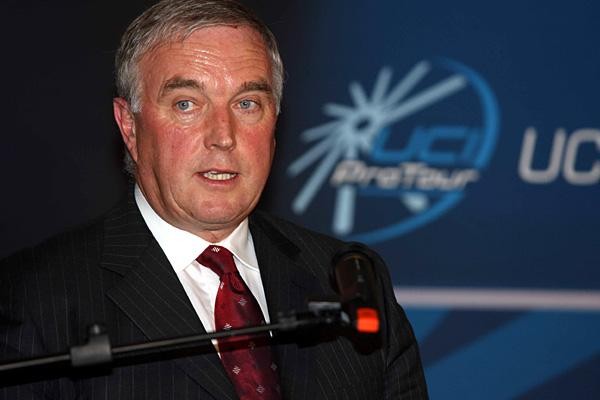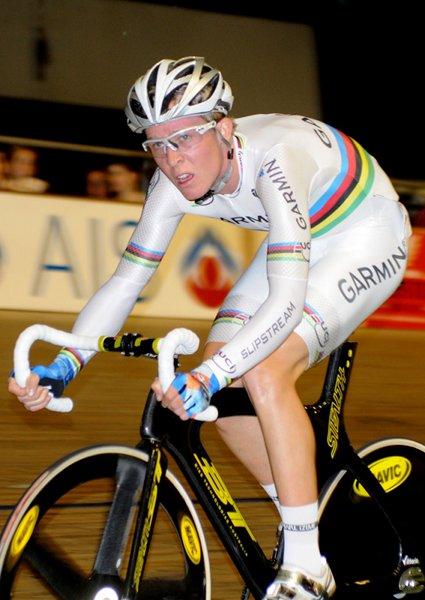McQuaid: We tried to get more Olympic medals
UCI President comments on pursuit exclusion as decision looms
The latest race content, interviews, features, reviews and expert buying guides, direct to your inbox!
You are now subscribed
Your newsletter sign-up was successful




Addressing the controversial plans to drop several key events from the Olympic programme, International Cycling Union President Pat McQuaid has said that the UCI cannot get any more medals from the International Olympic Committee (IOC). Cycling’s governing body revealed earlier that there would be an equal allocation of medals for men and women in London 2012, with five sets each. This is a clear change from the situation at the Beijing Games, when the split was seven-three in favour of the men.
McQuaid said that the UCI tried to retain the seven events for the male riders, but were told this was not possible. “After Beijing we argued for more medals for the women in order to balance things up, but then they came back to us and said ‘sorry, we can’t give you any more’,” he told Cyclingnews. “They said, ‘if you want more women’s medals, we can accept that, but you must take them from the men’s allocation’.”
In the 2008 Games, athletics had 47 events split between men and women, while swimming had 34. Cycling, with road, MTB, track and BMX combined, had just 18. The controversy over the reduced track programme has led to protests from riders such as Olympic champions Bradley Wiggins and Rebecca Romero, while world champions Taylor Phinney and Cameron Meyer have shared their opinions on the matter. It has also prompted questions about why cycling cannot receive more medals.
McQuaid explained that there are set quotas, at least for 2012. “The Olympic charter states that there are 28 sports, 10,500 athletes and 301 disciplines,” he said. “That is what they are, tied to in that charter. They cannot therefore give new medals away willy-nilly, or bring in new events just like that. There is a restriction in place and it is not just for cycling – it’s there for all the sports.
“The only exception is for swimming and athletics, which don’t come into the quota system, as they are the core events of the Olympic Games programme,” he added. “Every other sport in the Olympic Games programme is restricted within its quota and within the number of medals it can have.”
Pursuit protests
This week has seen an upsurge in calls for the individual pursuit to be retained, with United States of America media reports arguing that it is one of the most historic of the track events. A number of riders have also commented on the matter, urging the UCI to choose other races to be dropped rather than that event.
The latest race content, interviews, features, reviews and expert buying guides, direct to your inbox!
Nothing is certain until the official announcement on December 12, but persistent rumours have it that that event is history, as are the points race and the Madison. A relatively new event, the omnium, is expected to be brought in.
McQuaid declined to confirm that speculation, saying that the matter is still being discussed and won’t be announced until December. However he did comment on those US media reports calling on the pursuit to be retained.
“These articles deal with the historical importance of pursuit and the riders who rode it,” he said. “They don’t deal with the issues that we have to deal with today, those we have going forward into tomorrow.
“If you ask anybody in America, they will say to keep the individual pursuit,” he added. “There is only one reason they are saying that, and this is Taylor Phinney. If this was four years ago, there wouldn’t be a comment coming out of America on the individual pursuit as they didn’t have an individual pursuiter.
“The point is that the UCI has to make decisions on behalf of the sport, not on behalf of particular individuals or particular interests. It has to be for the overall sport,” said McQuaid.
McQuaid admitted that the omnium doesn’t have anything like the same history as those events rumoured to be in danger. “No, but neither does the keirin,” he insisted. “But yet it is a very attractive event, a very popular event on the track.”
“It’s important to bear in mind too that whatever events go out of the Olympic programme, they will remain on the World Championship programme,” he added. “It is scare-mongering to say that if certain events come out of the Olympic Programme, that it will kill the event or kill track racing.”
“I mean, we had to take out the kilometre four years ago in order to bring in BMX. The kilometre is still a strong event in the World Championship,” he said. “It hasn’t disappeared because it came out of the Olympic programme – it is still in the World Championships every year.”
Post-London review – could more medals be given?
Cycling – and other sports – will face a review in 2013, with the success of the latest Games and other factors being weighed-up in deciding the programme for Rio de Janeiro, Brazil. McQuaid said that there is scope for the sport to try to obtain more medals, and thus to increase the number of track events, but equally there is a chance it could lose some – or even, worst case scenario, be dropped from the Olympics.
“In Singapore [2005], it was announced that baseball and softball were going out of the Games programme,” he stated. “Cycling has to ensure that when that review is taken, that the sport will remain within the Olympics.”
Doping issues are one factor which could influence that decision. The positive cases seen in recent Tours have led to calls from some that cycling should be dropped from the programme, although the biological passport will have helped the sport’s case. The positive case of Davide Rebellin at last year’s Olympic Games however did leave the same impact.
"If cycling doesn't resolve this problem, I'd go so far as saying it should be excluded from the Olympics," Swiss International Olympic Committee member Rene Fasel told the AP back in 2007. This was echoed one year later by IOC vice-president Thomas Bach, although the committee’s president Jacques Rogge played this down.
McQuaid said that remaining within the Games is the most crucial matter. “This is the elements that we have to consider more importantly than individual federations’ preferences as to what events should or should not be in the programme,” he said. “There a lot more issues than just the historical significance of a particular event or two events, or whatever it may be. There are a huge number of issues.”
That well may be the case, but it’s certain that the murmurs of discontent will become a whole lot louder next month. Whatever the decision, large numbers will be unhappy, and the debates will rage.
